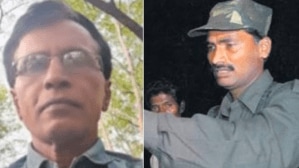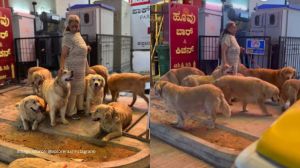US tanks roll into Saddam’s palaces
US troops stormed into the heart of Baghdad on Monday, occupying presidential palaces, and found substances in central Iraq they said could...

US troops stormed into the heart of Baghdad on Monday, occupying presidential palaces, and found substances in central Iraq they said could turn out to be a ‘‘smoking gun’’ indicating banned chemical weapons.
The US military said the assault on central Baghdad by over 100 tanks and armoured vehicles was a show of force, rather than a final attack on the sprawling city of five million.
As night fell, US troops remained in the capital, proof they could strike at will.
There was no word on Saddam’s whereabouts but there was footage of him on Iraqi TV. Wearing military fatigues, he was shown holding a meeting with his son Qusay and top aides. But it was unlikely he was anywhere near his official palaces, which have been hit repeatedly in almost three weeks of air strikes.
British Defence Secretary Geoff Hoon said he was unsure of the location of Saddam and his sons, Uday and Qusay. But he said there were ‘‘strong indications’’ that Ali Hassan al-Majid, or Chemical Ali, Saddam’s cousin and military commander in southern Iraq, was dead. Majid earned his nickname for ordering poison gas attacks on Kurds in the late 1980s.
Coalition commander General Tommy Franks visited troops in three different locations in Iraq. But no details were made available.
There was word though that initial tests on substances found at a military training camp in central Iraq revealed levels of nerve agents Sarin and Tabun and the blister agent Lewisite.
‘‘If tests from our experts confirm this, this could be the smoking gun. It would prove Saddam has the weapons we have said he has all along,’’ Major Michael Hamlet of the US 101st Airborne Division told Reuters correspondent Kieran Murray.
Hamlet said a team of experts would carry out further tests on Tuesday on the substances found at a camp in Albu Mahawish, on the Euphrates river between Kerbala and Hilla, site of ancient Babylon.
In what appeared to be a separate incident, US National Public Radio reported US forces near Baghdad found a cache of 20 medium-range missiles equipped with potent chemical warheads.
Citing a top official with the 1st Marine Division, NPR said the BM-21 missiles were equipped with Sarin and mustard gas and were ‘‘ready to fire.’’ US Central Command headquarters in Qatar had no immediate comment on the NPR report.In the south, British and US troops walked unopposed almost to the centre of Basra for the first time. Hoon said British forces had moved to the heart of Basra and were there to stay.
Iraqi Opposition leader Ahmad Chalabi also arrived in the southern town of Nassiriya at the head of 700 fighters, joining the US military campaign against the regime.
US Secretary of State Colin Powell, travelling with President George Bush to Northern Ireland, said the military campaign was going ‘‘exceptionally well’’ and that Washington would send a team to Iraq this week to begin looking at what’s needed to set up an interim Iraqi authority.
But the event of the day was the armoured column thrust into central Baghdad with relative ease. Two US Marines were killed and three wounded as they battled for two river bridges in the east.
Marines said their comrades had died in ‘‘friendly fire’’ when an artillery shell fired by their own side fell short. The Marines later crossed the Diyala river even though the Iraqis had damaged the bridges to slow them up. Two US soldiers and two journalists were killed and 15 people wounded in an Iraqi attack on a communications centre in the southern outskirts of Baghdad, military sources said.
Iraq said the invaders were ‘‘committing suicide’’ at the gates of the capital. Denying what was visible to many Baghdad residents as well as television viewers around the world, Information Minister Mohammed Saeed al-Sahaf said there had been no big US raid.
‘‘Baghdad is safe,’’ he told reporters at the Palestine hotel as a dense yellow sandstorm swept over the city, mingling with smoke from oil fires lit to obstruct the invaders. US columns had been ‘‘slaughtered,’’ Sahaf said. ‘‘The Iraqis are definitely fighting back,’’ said Reuters correspondent Samia Nakhoul from a central vantage point. (Reuters)






- 01
- 02
- 03
- 04
- 05

























